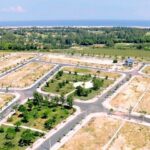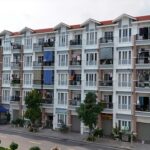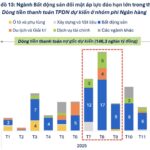According to statistics from the Vietnam Real Estate Brokers Association (VARS), apartment prices in Hanoi, Ho Chi Minh City, and Da Nang have grown by 72.4%, 49.9%, and 34.3%, respectively, over the past five years.
In contrast, the average income of the population has only increased by about 6-10% annually and remains relatively low. This situation forces young workers to rent instead of buying due to financial constraints and the inability to afford long-term loans.
Nguyen Quynh Anh, a Hanoi resident who spends 14 million VND per month on rent, shares that her monthly income is about 35 million VND, which is not low compared to the average salary. However, it barely covers the high cost of living in Hanoi. Despite saving since graduation, Quynh Anh has only managed to put aside about 800 million VND, which is not enough to buy a property in Hanoi, even with a bank loan. Therefore, she chooses to rent to avoid financial pressure.
Quynh Anh further explains that by renting, she can live in a convenient apartment in the heart of Hanoi for 14 million VND per month, equivalent to 30-32% of her income. In contrast, if she were to buy a property, she would have to allocate 60-70% of her income to debt repayment.
“It’s acceptable for young people like me to allocate 30% of my income to a fee that covers both accommodation and the improvement of my labor productivity and quality of life, without the pressure of having to tighten my belt to repay debt,” she shares.
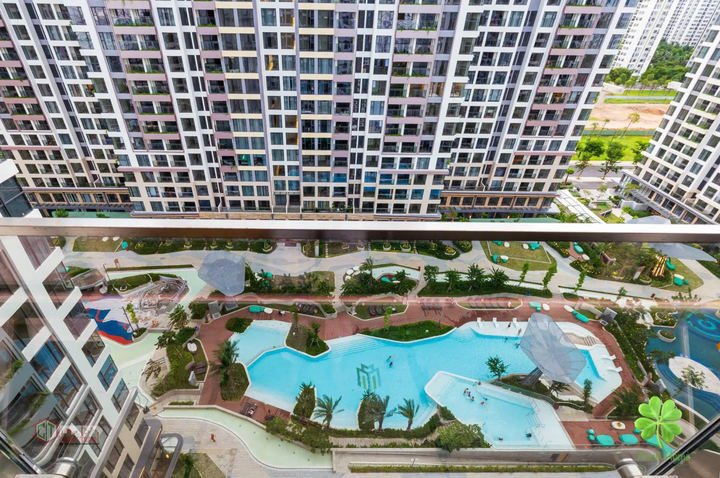
Rental apartments gain popularity as property prices soar. (Illustrative image)
Similarly, Nguyen Tan Dat, a resident of Vinh Tuy ward in Hanoi, shares that a modest apartment in the city now costs over 3 billion VND. To purchase one, he would have to take out a loan of at least 2 billion VND and spend the next 15-25 years dedicating more than 60% of his income to debt repayment.
“I’d rather rent for life and save for my retirement than worry about debt,” Dat says.
With a monthly income of 22 million VND, Dat rents a room for 5 million VND (excluding utilities). On average, he spends at least 12-13 million VND on living expenses and shopping and can save a maximum of 7-10 million VND per month.
With only 500 million VND in savings, buying a multi-billion-dollar property in the city is out of reach. Therefore, he chooses to rent to avoid worries and spend his money on other things.
Dr. Vo Tri Thanh also points out that the trend of young people renting is very high, especially in major cities like Hanoi. “Basically, they prefer to rent instead of buy. We can clearly see this reality,” Mr. Thanh asserts.
Mr. Hoang Lien Son, CEO of Alpha Real Investment and Real Estate Brokerage Company, agrees: “When people rent, they spend about 10 million VND per month. But if they buy the same apartment and take out a bank loan, they would have to pay about 14-15 million VND in monthly interest. This means that the cost of renting is only about 2/3 of the cost of buying and paying interest.”
VARS shares a similar view, analyzing that with the current property prices, a two-bedroom apartment costing less than 3 billion VND is almost non-existent. Even with financial readiness equivalent to about 30% of the property value and choosing to take out a loan for the remaining amount, corresponding to about 2 billion VND, young people still face countless difficulties in obtaining a loan. Opting for a loan means committing to a 15-25 year repayment plan or having to “tighten their belts” to cut back on other expenses to shorten the repayment period. This will significantly impact their quality of life. Floating interest rates that are hard to “predict” also make many young people reluctant to take out loans.
On the other hand, choosing to rent instead of buy helps young people maintain a flexible lifestyle and reduces financial pressure in the short term. However, to ensure a good quality of life and economic efficiency, young people need to carefully consider their financial situation and living needs.
According to a report by PropertyGuru Vietnam, more than 41% of tenants cannot afford to buy, do not want to be tied down by a mortgage, and find that renting is cheaper than paying monthly interest. With Vietnam’s estimated GDP per capita of about 9.5 million VND per month (2024), a young person (aged 25-40) would have to save for 26 years to own a 60-square-meter apartment worth about 3 billion VND (assuming a deposit interest rate of 4.5%/year).
The trend of renting will continue to grow
In the long run, Mr. Nguyen Van Dinh, Chairman of the Vietnam Real Estate Brokers Association, believes that the trend of renting instead of buying will continue to develop as new rental models that are popular worldwide will become more prevalent in Vietnam.
For example, long-term rentals with ownership options allow tenants to pay monthly and, after a certain period (5-10 years), purchase the property at a fixed price or have a portion of their rent deducted from the purchase price. Another model is co-ownership, where buyers only need to pay 30-50% of the property’s value upfront and continue to rent, gradually acquiring more ownership over time.
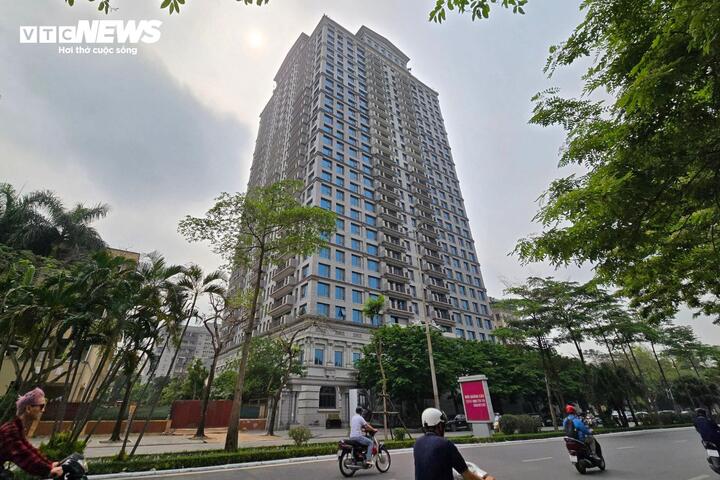
The trend of renting will continue to grow. (Illustrative image: Minh Duc)
“Renting can only become a popular choice when the rental market becomes more professional and receives support from financial policies. For instance, real estate businesses can participate in ‘build-to-rent’ models, and legal policies can protect tenants’ rights, limit annual rent increases, and encourage long-term contracts. Simultaneously, banks can offer credit packages for long-term rental models with ownership options, helping tenants eventually own the property,” Mr. Dinh explains.
Mr. Nguyen Quoc Anh, Deputy General Director of PropertyGuru Vietnam, also believes that besides financial issues, the mindset towards homeownership is gradually changing, especially among the younger generation. Approximately 28% of tenants choose to rent because they value the flexibility of being able to change their living environment. As a result, the increasing demand for rentals makes this segment increasingly potential in Vietnam.
He adds that the trend of searching for rentals increased by almost 22% in 2024. The highest demand comes from tenants aged 25-34 (nearly 62%), and even among those with higher incomes of 21-40 million VND per month, the rate of renting is about 42%.
According to experts, while the trend of renting will grow in the future, there are still many issues to be addressed in developing the rental housing sector.
Dr. Tran Xuan Luong, Vice President of the Vietnam Institute for Real Estate Research and Evaluation, points out that the rental apartment market lacks professionalism and transparency. Transactions mainly occur between individuals without the involvement of intermediary units or data-verified platforms. This situation leads to information chaos in the market, especially when some reports provide average indices for the entire market without separating data by area, segment, project age, or occupancy rate.
“Reporting a decrease in rental prices is not wrong in terms of numbers, but it may only reflect a localized phenomenon in a few old buildings, less convenient locations, fewer amenities, or under liquidity pressure. In contrast, rental prices in areas with high demand for real estate remain stable or even increase,” Mr. Luong analyzes.
Notably, while landlords can adjust prices according to market fluctuations, tenants have little bargaining power. High demand, especially from foreigners, experts, students, and migrant workers, means that conveniently located apartments with full furnishings are always in short supply.
In many cases, tenants have to pay 300,000-1,000,000 VND more per month when renewing their contracts. Others are asked to pay additional service fees or deposits to secure their rental. This situation illustrates the tenants’ weak position due to limited options and the constant pressure of rising financial obligations.
The Vietnam Real Estate Brokers Association also points out that most rental housing in Vietnam is owned and managed by individuals, lacking the involvement of professional investors. In contrast, in developed countries, the ‘build-to-rent’ model is prevalent, providing tenants with more choices, reasonable prices, and better services.
Additionally, Vietnam lacks policies to protect tenants. Most rental contracts in Vietnam are short-term (6-12 months) and do not include clauses regarding conditions and rent increases, leaving tenants vulnerable to instability and unprotected.
Furthermore, while the monthly financial burden is lower compared to opting for a mortgage, rental prices in Hanoi and Ho Chi Minh City remain high. A two-bedroom apartment in the center of Ho Chi Minh City rents for 12-20 million VND per month, equivalent to 30-50% of many workers’ income. This means that tenants have to cut back on other expenses, following the principle that housing costs should not exceed 30% of income. On the other hand, more affordable rental options are usually located in peripheral areas where public transportation infrastructure is underdeveloped, making tenants hesitant.
The Ultimate Guide to the Real Estate Market’s Year-End Outlook
The real estate market in 2025 is looking bright, according to experts. With positive indicators on the horizon, the latter half of the year is set to be a dynamic one, full of potential twists and turns. As we enter this pivotal period, it’s essential to recognize the diverse scenarios that could play out and the subsequent impact they may have.
A Home for All: Social Housing Opportunities
The Prime Minister’s agreement to raise the income threshold for social housing eligibility to 20 million VND per person per month offers a glimmer of hope for many aspiring homeowners.
The Looming Maturity Pressure on Real Estate Bonds in August Intensifies: Marking the Market’s Most Strained Period
“August sees a significant spike in the maturity value of non-bank group bonds, with an estimated face value of VND 27.4 trillion, a substantial 51.7% increase from the previous month’s value of VND 18.1 trillion. This surge in maturity value makes August the peak month for bond repayments in 2025.”

